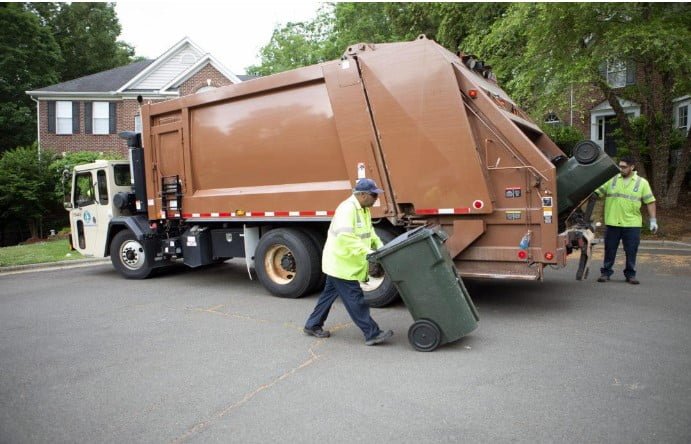Today’s world is urbanizing very rapidly and as a result, waste management has become an issue of pressing concern. This is because the amount of garbage generated continues to rise with an increase in population, making the need for efficient and sustainable solutions more crucial. These days, revolutionary approaches through effective recycling or repurposing practices have been deployed for garbage pickup.
In this article, we’ll be considering the need for efficient garbage pickup and repurposing, as well as examining the recycling strategies that can enhance the pickup process. We’ll also be discussing the importance of community engagement in reusing efforts, exploring some of the technological advances that have recently reshaped rubbish pickup services. Finally, we’ll take a concise look at the financial benefits of recycling programs.
The Need for Efficient Garbage Pickup and Recycling
In the introduction to this article, we established that the waste generated globally is on the rise daily. In this section, we shall be exploring the need for efficient garbage management.
The Importance of Efficient Garbage Pickup
First and foremost, maintaining a clean and healthy environment requires, among other things, a timely and reliable garbage pickup. This practice helps to prevent the spread of diseases and reduces the risk of environmental contamination. Furthermore, apart from contributing to the overall aesthetics of the vicinity, the quality of life for residents is improved in a neighbourhood with efficient refuse management.
The Benefits of Effective Recycling Practices
Recycling refuse is a beneficial practice in many ways such as helping to conserve natural resources and reducing greenhouse gas emissions – and the amount of waste that ends up in landfills. In addition, recycled materials can be sold to processing facilities as a means of generating revenue for municipalities.
Through proper public education programs residents can be taught the importance of sustainability and encouraged to practice an eco-friendly lifestyle. Also, the release of harmful electronic trash – such as computers and smartphones – into the environment can be prevented through proper repurposing of trash. You can read this article to learn more about the economic benefits of different recycling practices.
Recycling Strategies to Enhance Garbage Pickup
Various recycling methods have revolutionized the way rubbish collection and disposal is being handled today. Let’s explore some of these revolutionary strategies.
Implementing Comprehensive Recycling Programs
Programs that target materials such as plastics, metals and organic wastes can be developed to minimize the amount of rubbish sent to landfills. At other times, sensitive items such as documents are shredded and recycled to prevent identity theft and protect personal information. Where feasible, integrating recycling initiatives with existing refuse collection services can improve the overall efficiency of garbage pickup.
Enhancing Public Participation in Recycling
Through activities such as public awareness campaigns, community outreach programs and providing easy-to-use reusable facilities, general engagement and awareness can increase. Also, by offering incentives or rewards for residents who participate actively in the repurposing process people can be motivated to adopt sustainable waste management practices.
Investing in Modern Waste Collection Infrastructure
Investing in modern infrastructure includes upgrading waste collection equipment or integrating smart city technologies like sensors and data analytics to optimize refuse collection routes. This can also mean exploring alternative waste collection methods like underground rubbish storage systems or centralized collection points to help solve population increase challenges.
Embracing Innovative Waste Management Solutions
Innovative solutions such as converting organic waste into renewable energy or advanced sorting and processing methods are recent technologies that are equally helpful. These strategies can reduce the environmental impact of refuse management and improve the quality and value of recycled materials. With the circular economy principle, waste is seen as a resource that is used to drive the development of innovative product designs.
Community Engagement in Recycling Efforts
Communal efforts are needed to promote effective repurposing practices to change the way garbage pickup is handled. Let’s explore strategies to foster community involvement in this section.
Educating the Public on Recycling
To achieve public awareness, consider educational campaigns and programs, partnerships with local schools and community organizations and the utilization of various communication channels. Through these avenues more awareness is raised, environmentally conscious habits are instilled in the younger generation and proper waste management practices are imbibed.
Facilitating Convenient Recycling Opportunities
Facilitating easy recycling avenues includes such strategies as:
- Providing easy-to-access recycling facilities such as curbside pickup and centralized collection points.
- Ensuring the availability of a wide range of reusable bins and containers to cater to different types of waste.
- Implementing flexible recycling schedules and collection times.
- Collaborating with local businesses and organizations to establish drop-off locations.
Incentivizing Recycling Participation
Incentivization of participants often comes in different ways; below are examples of some approaches that have yielded proportionate interest from residents:
- Offering incentives or rewards such as discounts, contests, or recognition programs.
- Implementing a system where residents receive tangible benefits, like reduced waste disposal fees or tax credits for their recycling.
- Recognizing and celebrating individuals, households, or community groups who excel in repurposing activities.
Technological Advances in Garbage Pickup Services
The use of technology has transformed garbage pickup services. We shall now turn our attention to some of the latest technologies that have changed how waste management is done in the industry today.
Automated Waste Collection Systems
Automated garbage collection trucks use robotic arms to lift and empty trash containers. There are also those with sensor-equipped waste bins that can provide real-time information on fill levels. At other times, GPS-enabled tracking systems with advanced routing algorithms are used to facilitate traffic navigation and minimize fuel consumption.
Smart City Integration
Internet-connected sensors and data analytics can now be integrated into rubbish collection to provide valuable insights. With a broader smart city infrastructure, real-time data and predictive analytics can now be deployed. It can anticipate demand, proactively schedule pickups, and address any service disruptions or emergencies. By aligning garbage pickup services with other smart city initiatives, resource utilization can be optimized, and the environmental footprint of waste management reduced.
Advanced Waste Processing Technologies
Cutting-edge waste sorting and processing technologies are being deployed that facilitate the recovery and reuse of recyclable materials. Other state-of-the-art waste-to-energy solutions that divert rubbish from traditional disposal methods such as converting waste into renewable energy are being adopted too. The accuracy and efficiency of material identification, sorting, and recovery are being improved by the adoption of AI and machine learning technologies in garbage processing facilities. Other innovative recycling methods that can effectively expand the range of recyclable and reusable materials such as chemical and thermal processing are being explored.
Sustainable Fleet Management
Sustainable eco-friendly vehicles with capabilities to significantly reduce greenhouse gas emissions and improve the environmental impact of rubbish pickup services are now available. Advanced telematic and fleet management systems that can monitor driver behavior, optimize vehicle routing, and enhance fuel efficiency are now being deployed. This huge investment in waste collection vehicles and upgrades can extend their lifespan, improve operational reliability, and minimize the need for frequent fleet replacements.
Financial Benefits of Recycling Programs
As we bring this article to a close, let us explore the various ways effective repurposing practices can contribute to the financial well-being of waste management systems.
Revenue Generation from Recycled Materials
The potential for generating revenue from various commodity markets can be increased by diversifying the range of recyclable materials collected. This may elicit simple questions like: Can You Recycle Shredded Paper? The response is in the affirmative because there are proper methods of recycling shredded papers, metals, plastics and other materials. There are recycling processing companies that can partner with private sector organizations to enhance the financial viability of recycling programs.
Reduced Landfill Disposal Costs
When wastes are diverted from landfills the costs associated with landfill operations – including maintenance and tipping fees – are reduced. The lifespan of existing disposal facilities is extended when the amount of wastes sent to landfills are minimized. This in itself delays the need for costly investments in new landfill construction.
Lower Waste Collection and Transportation Expenses
Community-based recycling initiatives such as neighbourhood drop-off centers, or collaboration with neighbouring municipalities to consolidate waste management resources can drive down overall costs. Also, route and schedule optimization through data-driven technologies initiatives, and investment in energy-efficient rubbish collection vehicles are other ways to save on fuel and operational expenses in the long term.
Long-Term Economic and Environmental Benefits
The long-term environmental benefits of sustainable waste management practices are that they bring economic development and attract businesses, residents, and investment to the community. New job opportunities arise in the recycling and reprocessing industries while the reduction in the environmental impact of garbage can lead to improved public health outcomes for residents. They also reduce societal costs associated with pollution and environmental degradation.
VaVia is a tech-based trash removal business. We offer unique technology and a full ERP system specifically designed for dumpster rental operations.
Conclusion
Embracing effective recycling practices revolutionizes garbage pickup by reducing environmental impact and generating revenue from recycled materials. It has also helped to lower operational costs and promote sustainable communities. However, for successful implementation practices, there’s a need for a collaborative effort between all participants or parties – governments, businesses, and residents. Innovative waste management strategies for a cleaner future are further enhanced through technological advancements and public education.






